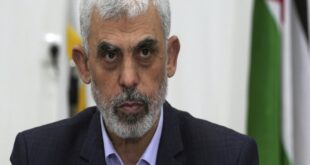
The sun is rising on a new day for Colombians, especially for those who Vice President-elect Francia Marquez calls the “nobodies”: women, Indigenous communities, Afro-Colombians, LGBTQ+, working class, disabled people and all the others who have been disproportionately impacted by poverty, state violence, discrimination and environmental destruction in the country.
On Sunday, former Bogota Mayor Gustavo Petro and his candidate for vice president, environmental activist Marquez, made history by securing more than 50 percent of all votes in Colombia’s presidential election and setting themselves up to form the country’s first-ever left-wing, progressive government.
This was not an easy victory. In the second round of the election, Gustavo and Francia ran against right-wing construction magnate Rodolfo Hernandez who had the backing of the outgoing Conservative President Ivan Duque, the right-wing “Centro Democratic” party that has been in power for more than two decades, as well as the media and powerful elites.
Despite running an aggressive and well-funded campaign focused on anti-corruption, however, Hernandez – who is ironically facing corruption allegations of his own – failed to win over enough support to secure the presidency. In an election that saw the highest turnout in Colombian history, millions chose instead to vote for a left-wing anti-establishment duo promising profound social and economic change.
Petro and Marquez’ success was not accidental – years of grassroots organising and left-wing coalition building led to this moment. Indeed, there were signs of a progressive shift in Colombia long before this election.
In late 2019, when the right-wing government of President Duque proposed to lower the minimum wage for workers under 25 years old, young people tired of decades of austerity and marginalisation took to the streets across Colombia, initiating a “paro nacional” (national strike) that brought the country to a standstill. Strike action and protests continued even at the height of the COVID-19 pandemic. In April 2021, an increase in taxes, corruption and healthcare reform proposed by the government triggered a new protest wave. People started taking to the streets to demand better education, public transportation and healthcare, and to voice their grievances with the government, in almost all cities. The government responded to the protests with violence. At least 44 protesters were killed and hundreds were injured, according to the United Nations.
When Petro and Marquez started their electoral campaign in 2022, the unmet demands of the “paro nacional” and grassroots protests that followed still occupied the minds of many Colombians. Despite strong resistance from the establishment, people were clearly ready for – and actively demanding – systemic change. Nevertheless, the campaign proposals put forward by Petro and Marquez were still relatively modest: they promised a tax reform that would provide the state with extra funds to spend on efforts to improve the country’s education and health systems and to end Colombia’s fossil fuel dependence through a just energy transition. Still, the right-wing establishment argued that the modest proposal was “too ambitious”, “unrealistic” and even “counterproductive” – perhaps because Petro plans to acquire much-needed extra funds not by increasing taxes on food items like President Duque, but by raising taxes on the country’s 4,000 wealthiest families, removing some corporate tax benefits, raising some import tariffs and targeting tax evaders.
Petro and Marquez’ election victory is the beginning of a new, positive chapter not only in Colombia but the entire region, for several reasons.
First and foremost, Petro won the presidency on a promise to make Colombia a leader in the global fight against climate change. He repeatedly emphasised his determination to better the living standards of Colombians while also working towards saving the Amazon rainforest. In his victory speech, Petro explicitly called upon other progressive leaders in Latin America to make ending their countries’ dependence on fossil fuels a part of their plans for achieving economic and social justice.
What Petro said in his victory speech was a reiteration of the many climate change-related proposals he tabled during his campaign, such as an immediate ban on unconventional oil fields, fracking pilot projects, and the development of offshore wells, and an end to new licences for fossil fuel exploration.
Instead of fossil fuel production and consumption, which has brought so much destruction, displacement and violence to Colombia, Gustavo Petro and Francia Marquez are committed to building a new, green economy. The just energy transition that Colombia is now committed to undertaking under the guidance of its new government will provide environmental movements across Latin America and the world with a blueprint for success.
The results of Colombia’s presidential election will also be a source of inspiration for progressive social movements across the world. Petro and Marquez clearly showed that determined grassroots organising and coalition building can achieve results even against a huge pushback from the right-wing establishment. Throughout this election season, Petro’s rivals highlighted his past involvement in the M19 rebel group, which demobilised in the 1990s, to turn Colombian people against him. When this didn’t work, they started distorting the promises he made in his manifesto to make him look like an unserious candidate who cannot handle the challenges facing the country. But none of these smear campaigns succeeded thanks to the strong bonds Petro and Marquez built with Indigenous communities, Afro-Colombians, peasants, women, gender-diverse people and many other strategic constituencies over the years.
All in all, Petro and Marquez’ election victory is not only a win for Colombians but all peoples of the region because it marks the beginning of a new “pink tide” in Latin America – the emergence of a new wave of socialism that puts climate justice at its core, and is ready to transform the ways we live and relate to each other to protect our collective future.
The next four years will not be easy for Colombia’s new government, as it will need to work against a bruised but still strong right-wing establishment that is desperate to take back power. But despite all the challenges still on the horizon, with Petro and Marquez in power, “nobodies” in Colombia and across the region can now speed up their efforts to build an inclusive, just and prosperous future for all that is free of threats of violence, hunger and climate devastation.

By Tatiana Garavito Colombian facilitator and organiser working on the intersections of race And Nathan ThankiHuman ecologist and writer – Aljazeera




 World Opinions Débats De Société, Questions, Opinions et Tribunes.. La Voix Des Sans-Voix | Alternative Média
World Opinions Débats De Société, Questions, Opinions et Tribunes.. La Voix Des Sans-Voix | Alternative Média




